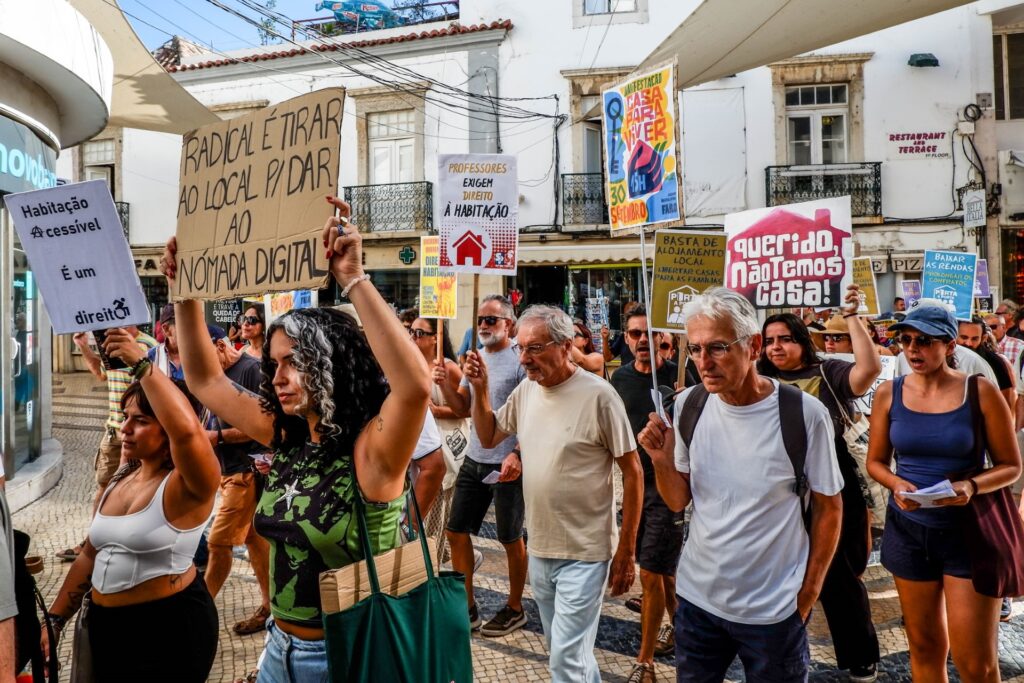A demonstration, called by the “Casa Para Viver” platform, will take place this Saturday, January 27th, in four Algarve cities.
The first location will be Albufeira, early in the morning from 10:30 am, with a meeting point at Rotunda do Relógio.
In the afternoon, the demonstration will take place in Faro, Lagos and Portimão from 15pm.
In the Algarve capital, the meeting place will be at the Rotunda do Teatro das Figuras, while in Portimão the meeting point will be Largo 1º de Outubro. In Lagos, protesters will concentrate on Rua Silva Lopes.
In Beja, it will also be in the morning, but from 9 am, with a gathering in front of the Santo Amaro Market.
The Casa Para Viver platform wants housing to be “a central theme” of the campaign for the March legislative elections.
«We want housing to be a central theme of the legislative campaign, so that people can vote and see the solutions that exist to ensure this right, which is yet to be fulfilled, debated», says Vasco Barata, one of the spokespersons for Casa Para Viver, in statements to Lusa.
Not knowing how they will pay rent and installments to the bank «remains the biggest uncertainty» for people, highlights the also member of the Chão das Lutas association – one of the more than one hundred collectives that make up the platform.
«The issue of housing remains very present in people's lives» and this is what justifies the decision to «take to the streets again», after similar demonstrations in April and September, which brought together thousands of people.
The protest also aims to “replace” the issue of housing “at the center of the debate”, at a time when the legislative elections, scheduled for March 10, are approaching.
The platform does not intend to «intervene directly in the campaign», but wants «the issue of housing, which was so discussed during the last two years, during the absolute majority, to continue to be the topic of political discussion», emphasizes Vasco Barata.
The elections “have to talk about housing”, a “concrete problem in people's lives”, emphasizes the lawyer.
“It makes perfect sense” to return to the streets, to have “a say”, in this phase of “political uncertainty”, he insists.
Since April 1, 2023, no one has left the platform and «others have been added to the more than one hundred associations», according to Vasco Barata.
«It is a movement that has been welcoming more and more associations. It's good to see that this social movement has managed to maintain consistency over time, since April 01, 2023, with three demonstrations, one concentration", he recognizes.
«This gives us the guarantee that society is organized to demand answers in terms of the housing problem and that this will inevitably continue after the elections», he observes, stressing that housing «is not a problem for Lisbon and the Porto, it's a national problem».
Among the platform's demands – delivered to political parties in June – are proposals such as regulating and lowering rents and bank payments, suspending evictions without housing alternatives, placing vacant properties owned by large owners on the market, ending incentives for real estate speculation and real estate investment funds and end benefits for non-habitual residents.
In parallel, they defend strong investment in public and cooperative housing.
«Following the 25th of April, we had the ability to construct responses that make our society very proud, the public school, the National Health Service, a public pension system», highlights the lawyer, remembering that the establishment of democracy in Portugal turns 50 years old.
«Unfortunately, in housing, the solutions were different and simply invested in subsidies to banks to provide cheaper housing credit. No relevant public housing stock was built. It was, without a doubt, the fundamental right forgotten by April, it was where the revolution did not arrive as it should have arrived», highlights Vasco Barata.



















Comments